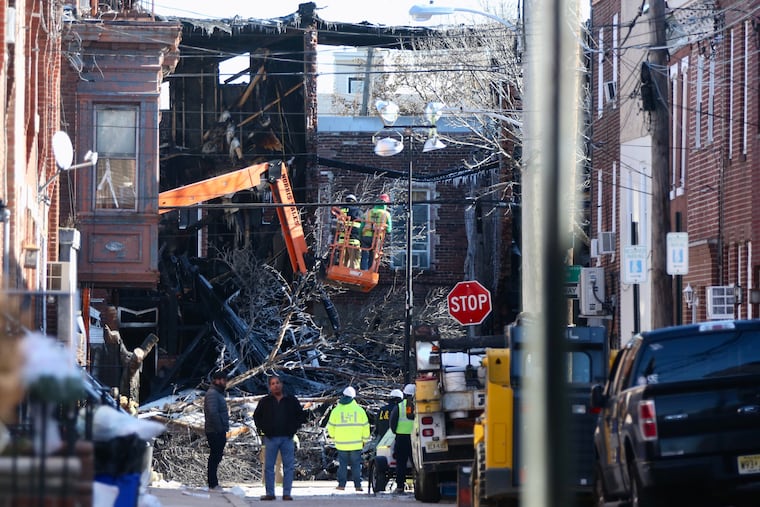PUC settles case with PGW over deadly 2019 house explosion in South Philly
As part of the settlement, PGW will establish a pilot program to provide free methane detectors and alarms to residential customers.

The Pennsylvania Public Utility Commission has approved what it called a “landmark settlement” with the Philadelphia Gas Works that includes “pioneering safety initiatives” to resolve litigation arising from a 2019 house explosion in South Philadelphia that killed two people.
As part of the settlement, approved Wednesday, PGW will launch within nine months a pilot program to provide free methane detectors and alarms to residential customers, the PUC said. PGW will dedicate $800,000 to the program, establishing a “critical early-warning system for potential gas leaks.”
On Dec. 19, 2019, a natural gas explosion on the 1400 block of South Eighth Street caused three rowhouses to collapse, severely damaged two others, and led to a three-alarm fire and an estimated $1.4 million in property damage.
Brian Diu, 28, and Rudi Kambong, 65, were killed.
The PUC voted 5-0 to approve a revised settlement that resolves a complaint filed in 2022 by the commission’s independent Bureau of Investigation and Enforcement.
The Bureau of Investigation and Enforcement had originally called for a combined civil penalty of $1,311,882.
The PUC’s 61-page opinion and order states that as part of the settlement: “In light of the monies spent for the remedial and enhanced safety measures outlined below, no civil penalty will be imposed.”
A spokesperson for PGW could not be reached for comment Wednesday evening.
Besides establishing the pilot program for methane detectors, PGW also will pursue up to $125 million in federal funds to modernize its natural gas distribution system. The money will be used to speed up the replacement of small-diameter cast-iron pipes.
Shortly after the explosion, PGW said the explosion came from a cracked six-inch cast-iron main installed in 1928.
As part of the settlement, PGW will improve its process of identifying underground problems, addressing scenarios where cast-iron pipes may be exposed or damaged.
PGW also will improve its communication and collaboration with the Philadelphia Water Department, other city officials, owners of underground facilities, and excavators to prevent infrastructure damage and ensure the long-term safety of PGW’s cast-iron pipes.
In the months prior to the explosion, investigators determined, there were multiple excavations conducted in the area of the cast-iron main that contributed to its damage.
In April 2020, PGW completed installation of a new plastic main and service lines to replace the aging cast-iron system in the area of the explosion.
Modernizing the entire system remains a monumental task.
“At the recent pace of removing an approximate average of 33 miles of cast iron per year, PGW is expected to remove all cast iron in about 38 years, or by 2060,” the opinion states.
PUC Chairman Stephen M. DeFrank said in a statement: “While we can never undo the tragic events of 2019, we can honor the victims by turning this incident into an opportunity for meaningful change. Launching a first-of-its-kind methane detector program and accelerating the replacement of aging infrastructure underscore our top priority of public safety.”
Last month, the PUC’s Bureau of Investigation and Enforcement said in a filing that it was seeking a $300,000 civil penalty against PGW over a Nov. 30, 2021, South Philadelphia gas explosion.
That explosion injured three people and resulted in more than $100,000 in damages.